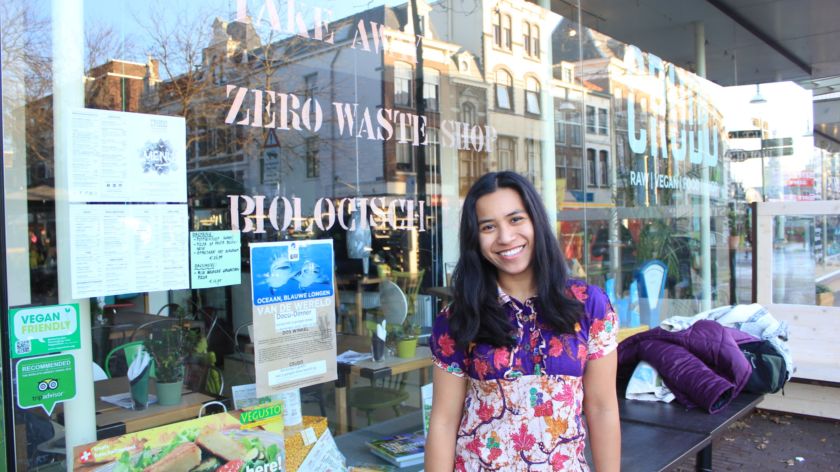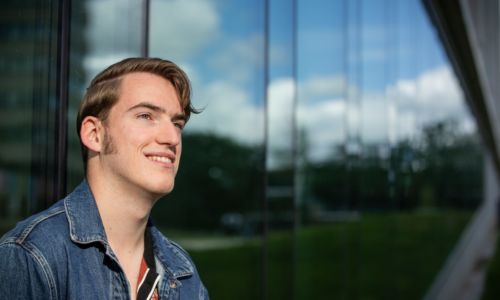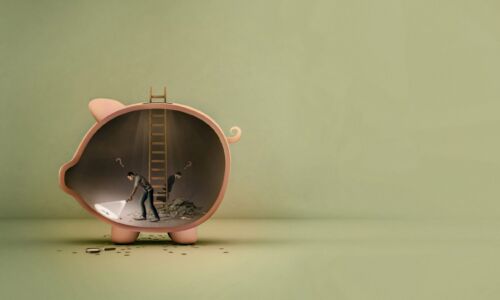Make the world a little better: Plastic-free life
-
 Nila Patty. Foto: Ming Zu
Nila Patty. Foto: Ming Zu
You don't immediately have to change the world, but do something! After Lucas de Man, theater producer, called for small-scale action last month, Vox found three students that give a good example. The first is Nila Patty (Medical Biology), who has been living waste-free since this summer. How does she do this?
Why did you decide to live waste-free?
‘I come from Indonesia, where practically nothing is recycled. The country is second on the list of contributers to plastic waste in our oceans. When I came to Nijmegen, I discovered a whole new world. Here, almost everything is recycled. On top of that, the realisation grew that we have to do something now to keep the planet liveable. Inspired by Laurent Singer’s blog and Bea Johnson’s blog about waste-free living, I decided to stop buying products that lead to plastic waste in January. And since July, I have been trying to live completely waste-free. That means I do not create trash that gets burned in the oven on a dumping ground. I can recycle and compost. I wanted to show my friends and family in Indonesia that it is possible.’
But it is possible to recycle plastic, right?
‘With plastic, we downcycle. The plastic’s quality decreases during the process, and eventually, the plastic that is too damaged will get burned anyway. Paper, glass and metal can be recycled without ending up on a dumping ground. On top of that, a lot of plastic ends in the plastic soup in the ocean and that is a serious attack on our eco systems. I want to prevent that.’
How do you live waste-free?
‘First of all, I scratched all products that come in plastic packagings of my shopping list. I always take my own shopping bag, cotton bags and food storage containers to the market and ask if the marketmen want to put the food directly in those. When I first did that, they were a bit confused about it, but when I explained why I did it, they were supportive and enthusiastic about it. Now, they recognize me and I don’t even have to ask. After that, I looked for sustainable alternatives for plastic products, like bamboo toothbrushes, home-made deodorant and shampoo soap blocks.’
And how are you doing now, almost a year later?
‘Surprisingly well. It is like picking up a new hobby. At the beginning, it costs a lot of time and energy, because you are not used to it, but slowly it starts feeling normal and eventually, it becomes a habit. The funny thing is that I spend less money now, because I do not grab a quick snack at the supermarket anymore, and I plan my shopping so that I do not waste anything.
I like to see that unintentionally, I influence people around me. When I refuse to use a plastic straw at a restaurant or bar, my friends do that as well. And in the bakery that I go to, the owner started selling cotton bags to reduce the number of plastic bags that are used. When I saw that, I teared up a bit.
I also found more green initiatives since I started this. Soon, I can give a speech about ‘plastic disaster’ for the Indonesian ambassee’s women’s organisation in the Hague, and I held a pitch talk about ‘zero waste lifestyle’ for ‘Future builders, network for women’ in Nijmegen. It was also an honor to be sent to Ljubljana to support Nijmegen when it got the ‘Greenest city of Europe 2018′ prize.’
What drives you to live like this?
‘I want to make people aware of the current environmental issues and the way they influence them. That is why I also blog about it. I hope that they also do something. Sometimes I am afraid that I set goals for myself that are to unrealistic, but then I think: if a dream doesn’t scare you, it’s not big enough. We can make a difference.’
How can others get started?
‘Don’t turn your life around in one day, like me, it makes it hard to stick with it. Start small. A re-usable water bottle, food containers, glass jars and buying local products on the market are things that are easy, but make a difference. Buying second-hand clothes and products is also a piece of cake.’
Do you have one last message for the people who are not sure yet?
‘When I doubt my own contribution to the bigger picture, I always think of the saying: “when put together, small drops of water form a big sea”.’
[kader-xl]
Do you want to go on a waste diet? 14 tips
- Go grocery shopping at the market, with your own shopping bag and cotton bags
- Buy bamboo tooth brushes
- Use a re-usable handkerchief
- Menstral cups
- Re-use of glass jars
- Homemade deodorant
- Shampoo and soap bars
- Coconut oil instead of skin cream and lip balm
- Homemade tooth paste
- Natural sponge (Flying tiger)
- AKKU’s vegetable bag
- Metal cutlery and a metal straw(Dille en kamille), to take with you
- Secondhand clothes, board games, kitchen appliances
- Use a free green waste container from DAR
[/kader-xl]




Bren Murphy wrote on 18 april 2018 at 23:44
Great suggestions! There is so much to learn around choosing a plastic free lifestyle. Thank you for reminding us that plastic is not recycled – but down cycled – very important difference.
Grateful
Bren
http://www.stainlesssteelstraws.com.au